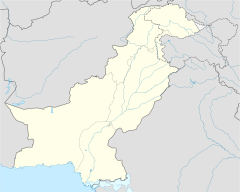On April 5, 2010, two bombings in Pakistan killed up to 50 people and injured 100 more. In the first attack the U.S. Consulate in Peshawar was attacked by militants. The coordinated attack involved a vehicle suicide bomb and attackers who tried to enter the U.S. Consulate in Peshawar by using grenades and weapons fire. Three explosions went off within a span of 15 minutes in the area of Saddar and Hayatabad Avenue, near the American consulate and the Peshawar headquarters of Pakistan's intelligence agency. Several militants came in two vehicles. The first vehicle exploded near a security checkpoint, and gunmen in the second car opened fire. A Tehrik-i-Taliban Pakistan spokesman claimed responsibility for the assault on the consulate. In Timergara, Lower Dir district an Awami National Party rally came under attack. Pakistani Taliban spokesman Azam Tariq said "Americans are our enemies. We carried out the attack on their consulate in Peshawar. We plan more such attacks."
The August 2011 Khyber Agency bombing occurred on 19 August 2011 in Jamrud, Ghundai within the Khyber Agency of FATA, Pakistan. At least 48 people were reported to have died after a suicide bomber exploded his vest at a mosque during Friday prayers in the month of Ramadan when about 300-500 people were praying; at least 40 others were also wounded.
In 2007, 34 terrorist attacks and clashes, including suicide attacks, killings, and assassinations, resulted in 134 casualties and 245 injuries, according to the PIPS security report. The report states that Pakistan faced 20 suicide attacks during 2007, which killed at least 111, besides injuring another 234 people. The PIPS report shows visible increase in suicide attacks after the siege of Lal Masjid.
This is a list of terrorist attacks in Pakistan in the calendar year 2011.
These are the list of Terrorist attacks in Pakistan in 2010.
In 2008, Pakistan saw 40 terrorist attacks, which caused 154 fatalities and 256 injuries.
In 2009, Pakistan suffered 50 terrorist, insurgent and sectarian-related incidents that killed 180 people and injured 300.
This is a list of terrorist incidents in Pakistan in 2012. Pakistan has faced numerous attacks by insurgents as a result of the ongoing War in North-West Pakistan by the Pakistani military against militant groups, part of the War on Terror. At the same time, there have also been numerous drone attacks in Pakistan carried out by the United States which exclusively target members of militant groups along the Afghan border regions.
This is a list of terrorist incidents in Pakistan in 2013. Some of the incidents are sectarian in nature and the TTP is responsible for a majority of them.
This is a list of terrorist incidents in Pakistan in 2014.
On 22 September 2013, a twin suicide bombing took place at All Saints Church in Peshawar, Pakistan, in which 127 people were killed and more than 250 injured. It was the deadliest attack on the Christian minority in the history of Pakistan.
This is a list of terrorist incidents in Pakistan in 2016. Pakistan was the 10th most dangerous country by criminality index in 2016.
Terrorist incidents in Pakistan in 2017 include, in chronological order:
On 13 February 2017, Jamaat-ul-Ahrar released a video announcing the launch of "Operation Ghazi", named after Abdul Rashid Ghazi who was killed in July 2007 inside the Lal Masjid. The operation started with the suicide bombing at the Mall, in which 12 civilians and six police officers were killed.

On 21 February 2017, suicide bombers targeted a sessions court in Tangi, Charsadda District, Khyber Pakhtunkhwa, Pakistan. At least seven people were killed, including a lawyer and more than 20 others injured. Tehrik-i-Taliban Pakistan faction Jamaat-ul-Ahrar claimed responsibility for the attack.
Operation Radd-ul-Fasaad is a codename of a combined military operation by the Pakistani military in support of local law enforcement agencies to disarm and eliminate the terrorist sleeper cells across all states of Pakistan, started on 22 February 2017. The operation is aimed to eliminate the threat of terrorism, and consolidating the gains of Operation Zarb-e-Azb which was launched in 2014 as a joint military offensive. It is further aimed at ensuring the security of Pakistan's borders. The operation is ongoing active participation from Pakistan Army, Pakistan Air Force, Pakistan Navy, Pakistan Police and other Warfare and Civil Armed Forces managed under the Government of Pakistan. More than 375,000 operations have been carried out against terrorists so far. This operation has been mostly acknowledged after Operation Zarb e Azb.
Terrorist incidents in Pakistan in 2018 include:
On 10 July 2018, a suicide bombing occurred at the Awami National Party's workers rally in Yaka Toot area of Peshawar, Khyber Pakhtunkhwa, Pakistan. Haroon Bilour, ANP's candidate for PK-78 and prime target of the attack, was killed as a result of the bombing. The attack left 22 people dead and wounded 75 others. Tehreek-i-Taliban Pakistan claimed responsibility for the attack.
Terrorist incidents in Pakistan in 2019 include:

